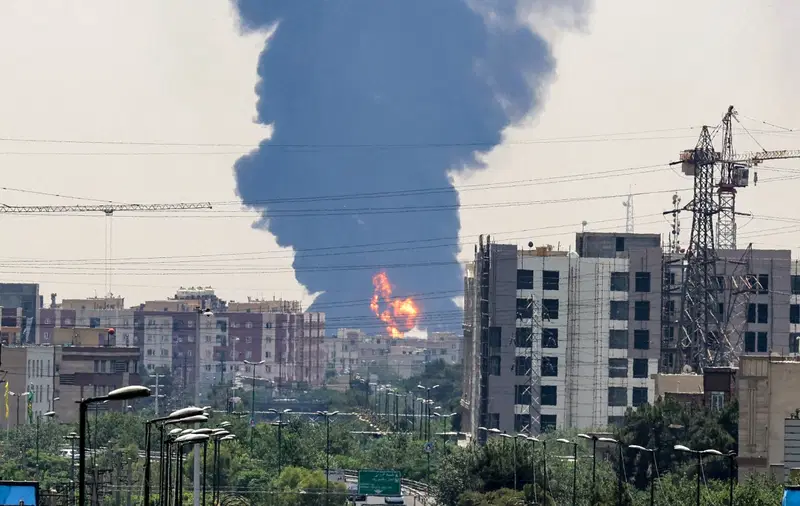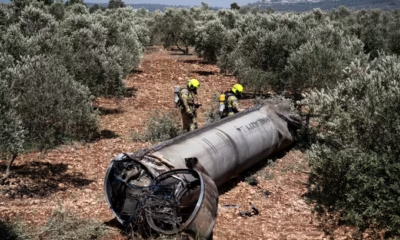Headline
Family Of Five Killed In Iranian Missile Strike After Fleeing Ukraine For Safety In Israel

A Ukrainian family of five who fled Russia’s war in search of safety were killed in Israel by an Iranian missile — the very conflict they thought they had escaped.
Mariia Pieshkurova had brought her 7-year-old daughter, Anastasiia, to Bat Yam, a suburb of Tel Aviv, hoping to get lifesaving cancer treatment and refuge from the violence at home.
Along with Anastasiia’s grandmother, Olena Sokolova, and two young cousins, Illia and Kostiantyn, they had started over — believing they were finally safe.
But on June 15, an Iranian missile tore through their apartment building during a retaliatory strike on Israel, killing them all.
“I really thought they’d be safe,” said Artem Buryk, Anastasiia’s father and Mariia’s former partner. “I never thought they’d go to Israel to escape war — and find it there.”
READ ALSO:US Struck Iran With B-2 Bombers, Submarine-launched Missiles – Top US General
The missile attack, part of Iran’s response to Israeli airstrikes on its territory, collapsed much of the building in Bat Yam.
It took four days to recover Mariia’s body from the rubble.
Their deaths marked a heartbreaking intersection of two wars — Russia’s invasion of Ukraine and Iran’s conflict with Israel — both of which had already tested the family’s will to survive.
Mariia had moved to Israel in late 2022 after Anastasiia was diagnosed with leukemia.
Ukraine’s hospitals were overwhelmed, and its largest children’s hospital was later destroyed in a missile strike.
In Israel, treatment began immediately. It was effective but costly. Mariia turned to Instagram, sharing photos of her daughter in treatment and videos of Artem pleading for help while serving on Ukraine’s front lines.
READ ALSO:Israel-Iran War: Stranded Nigerians Cry For Help From Underground Shelters
“Masha did everything for her little girl,” said Anastasiia’s godmother, Khrytsyna Chanysheva. “She dedicated her life to her, moved to Israel to get her full treatment.”
Despite the pain, Anastasiia always smiled at visitors.
“She was in pain, and she would close her eyes for a second,” said charity worker Lada Fichkovsi. “But every time I walked into her room, she would smile.”
Her cousins joined the family in May 2024 as the situation in Odesa deteriorated.
“The shelling made my children cry,” said Hanna Pieshkurova, Mariia’s sister. “I decided to let them go.”
Though Israel was at war with Hamas, Mariia had assured her sister that Bat Yam was calm. Air raid sirens were rare, and the Iron Dome defense system offered hope.
READ ALSO:Iran Nabs 22 Suspected Israeli Spies Amidst Escalating Conflict
“Ukrainians often say, ‘This is not Ukraine, it’s not as scary,’” said Inna Bakhareva of Chance4Life, a charity helping sick children in Israel. “They felt secure due to the Iron Dome.”
That sense of security evaporated after Israel struck Iranian targets on June 12. Iran retaliated with missile attacks across Israeli cities.
“Dad, at night I saw how the missiles were falling,” Anastasiia told her father in a voice message the night before she died.
She and her mother had been scheduled to visit the hospital the next morning. The missile struck before dawn.
Mr. Buryk, who had just returned from the front lines near Sumy, received the news that same day.
“I still don’t understand what’s happening,” he said. “I still can’t believe it.”
He used to promise Anastasiia they’d go fishing together when peace returned.
“Every time I talked to her, I’d say, ‘Sweetheart, we’ll go fishing. Just us,’” he said. “And now I just don’t understand. I still don’t even grasp that she’s gone.”
“Last night,” he added quietly, “I sent her voice messages.”
(New York Times)
Headline
Russia, China Afraid Of US Under My Administration — Trump

United States President, Donald Trump, has said Russia and China fear the United States because of the strength of his administration, arguing that American global influence is driven primarily by its military power and leadership.
Trump, in a post on Truth Social on Wednesday stated that rival powers would not take NATO seriously without the United States, claiming the alliance lacks deterrent force in the absence of American involvement.
He expressed doubts about whether NATO members would come to the aid of the US in a real crisis, despite Washington’s continued commitment to the alliance.
READ ALSO:Trump To Withdraw US From 66 UN, International Organisations
The president credited his leadership with rebuilding the US military during his first term and sustaining its strength, describing this as the key reason adversaries show respect and caution toward the country.
He maintained that America’s military dominance has played a central role in preserving global stability and saving lives.
Trump also argued that his administration forced NATO members to increase defence spending, saying many allies had previously failed to meet financial commitments while relying heavily on the US.
READ ALSO:Insecurity: US Congressman Riley Moore Reveals Trump’s Mission In Nigeria
He added that his actions helped prevent further escalation in Eastern Europe and contributed to the resolution of multiple conflicts.
According to Trump, the United States remains the only nation that commands genuine fear and respect from both Russia and China, a position he attributed to his administration’s approach to defence, diplomacy, and global leadership.
“He wrote partly, “The only Nation that China and Russia fear and respect is the DJT REBUILT U.S.A. MAKE AMERICA GREAT AGAIN!!! President DJT.”
Headline
Trump To Withdraw US From 66 UN, International Organisations

United States President, Donald Trump, has announced plans to withdraw the US from 66 United Nations and international organisations, including key global bodies focused on climate change, peace and democracy.
The decision was disclosed in a presidential memorandum released by the White House on Wednesday evening, following a review of which “organizations, conventions, and treaties are contrary to the interests of the United States.”
According to Trump, the move will see the US end its participation in the affected organisations and cut all related funding.
A list shared by the White House showed that 35 of the organisations are non-UN bodies, including the Intergovernmental Panel on Climate Change (IPCC), the International Institute for Democracy and Electoral Assistance, and the International Union for Conservation of Nature.
READ ALSO:Trump’s Airstrikes: Halt Military Cooperation With US Immediately – Sheikh Gumi Tells Tinubu Govt
Although listed as a non-UN body by the White House, the IPCC is a United Nations organisation that brings together leading scientists to assess climate change evidence and provide periodic reports to guide political leaders.
The memorandum also announced the US withdrawal from 31 UN entities, including the UN Framework Convention on Climate Change (UNFCCC), the UN Democracy Fund, and the UN Population Fund (UNFPA), which focuses on maternal and child health.
Several of the targeted UN bodies are involved in protecting vulnerable groups during armed conflicts, including the UN Office of the Special Representative of the Secretary-General for Children and Armed Conflict.
Reacting to the announcement, UN spokesperson Stephane Dujarric said in a note to correspondents on Wednesday evening that the organisation expected to issue a response by Thursday morning.
Despite repeatedly stating his desire to limit US involvement in UN forums, Trump has continued to exert influence on international decision-making.
READ ALSO:Trump Using FBI To ‘Intimidate’ Congress, US Lawmakers Cry Out
In October last year, he threatened to impose sanctions on diplomats who formally adopted a levy on polluting shipping fuels that had already been agreed to at an earlier meeting, a move that stalled the deal for 12 months.
The Trump administration also sanctioned UN special rapporteur Francesca Albanese after she released a report detailing the role of international and US companies in Israel’s genocidal war on Gaza.
During his first term in 2017, Trump similarly threatened to cut aid to countries that supported a draft UN resolution condemning the US decision to recognise Jerusalem as Israel’s capital.
As a permanent member of the UN Security Council, the US wields significant influence at the United Nations, including veto power, which it has repeatedly used to block efforts to end Israel’s war on Gaza before later mediating a ceasefire.
(Aljazeera)
Headline
UK Supported US Mission To Seize Russian-flagged Oil Tanker – Defense Ministry

The British Ministry of Defence said on Wednesday that it provided support to the United States in its operation to seize a Russian-flagged oil tanker in the North Atlantic.
US seized the tanker, which was being shadowed by a Russian submarine on Wednesday, after pursuing it for more than two weeks across the Atlantic as part of Washington’s efforts to block Venezuelan oil exports.
According to Britain, its armed forces gave pre-planned operational support, including basing following a US request for assistance.
READ ALSO:UK Introduces Powers To Seize Phones, SIM Cards From Illegal Migrants
The UK also said a military vessel provided support for the US forces pursuing the tanker, and the Royal Air Force provided surveillance support from the air.
Defence Secretary John Healey stated that the operation targeted a vessel with a nefarious history linked to Russian and Iranian sanctions evasion networks.
“This action formed part of global efforts to crack down on sanctions busting,” he said in a statement.
READ ALSO:Venezuelan Deportees: US Embassy Gives Reason For Reducing Visa Validity For Nigerians
According to him, the US was Britain’s closest defence and security partner.
“The depth of our defence relationship with the US is an essential part of our security, and today’s seamlessly executed operation shows just how well this works in practice,” he added.
The British government said that the Bella-1 tanker, now renamed Marinera, is sanctioned by the US under its counter-Iran sanctions,
The MoD statement said the support was provided in full compliance with international law.

 News4 days ago
News4 days agoWhat I Saw After A Lady Undressed Herself — Pastor Adeboye

 Headline4 days ago
Headline4 days agoPROPHECY: Primate Ayodele Reveals Trump’s Plot Against Tinubu

 Metro4 days ago
Metro4 days agoArmed Robbers Shot PoS Operator To Death In Edo

 Business3 days ago
Business3 days agoNNPCL Reduces Fuel Price Again

 Metro3 days ago
Metro3 days agoAAU Disowns Students Over Protest

 Metro4 days ago
Metro4 days agoJoint Task Force Kills 23 Bandits Fleeing Kano After Attacks

 Politics4 days ago
Politics4 days ago2027: Rivers APC Pledges To Follow Wike’s Instructions

 Metro3 days ago
Metro3 days agoEdo: Suspected Kidnappers Kill Victim, Hold On To Elder Brother

 Metro3 days ago
Metro3 days agoNine Soldiers Feared Dead In Borno IED Explosion

 Metro4 days ago
Metro4 days agoGunmen Demand N200m Ransom For Kidnapped Brothers In Edo




























